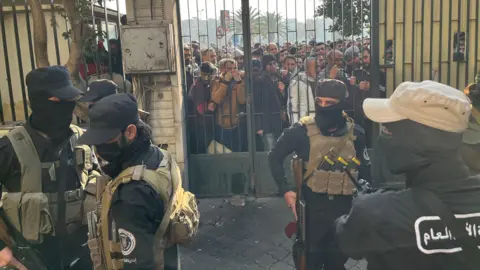 Aamir Peerzada/BBC
Aamir Peerzada/BBCOn the night time of 6 December, Mohammed el-Nadaf, a soldier within the Syrian military, was at his place in Homs.
As rebels led by Hayat Tahrir al-Sham (HTS) pushed into town, days after they’d seized management of Aleppo and Hama in a lightning offensive, Mohammed determined he did not need to battle.
“We had no orders, no info. I took off my uniform, left my weapons, and began to make my solution to my village in Tartous,” he mentioned.
At across the similar time, Mohammed Ramadan was at a place on the outskirts of the capital, Damascus.
“There was nobody to provide orders to us. Lots of our commanders fled earlier than us. So I assumed, why ought to I die and battle for somebody who did not even give me sufficient of a wage to have the ability to feed my household?
“For our every day rations as troopers we bought only one egg and one potato.”
The subsequent morning, he additionally left his place and went dwelling.
The testimony of the troopers gives an perception into the speedy collapse of ousted President Bashar al-Assad’s regime.
For a lot of of his demoralised and poorly paid forces on the bottom, the velocity at which their defence disintegrated within the face of the insurgent offensive didn’t come as a shock.
Many troopers informed us they had been paid lower than $35 (£28) a month and needed to do different jobs to get by in a rustic the place that may solely cowl a fraction of fundamental dwelling prices.
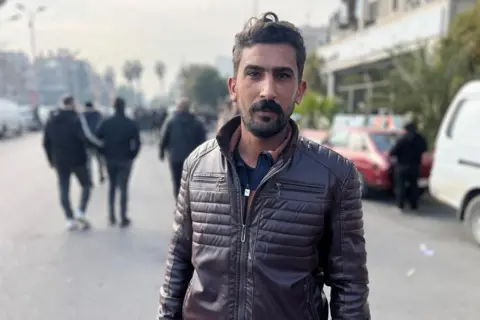 Aamir Peerzada/BBC
Aamir Peerzada/BBCMohammed Ramadan was clutching the Kalashnikov rifle he’d been beforehand assigned after we met him and several other others in Damascus greater than two weeks after the regime fell, at a “reconciliation centre” run by HTS.
On the centre, former army, police and intelligence officers, in addition to anybody who was a part of pro-Assad militia teams, can register for a brief civilian identification card and deposit their weapons.
HTS has introduced a common amnesty for individuals who labored for the previous regime.
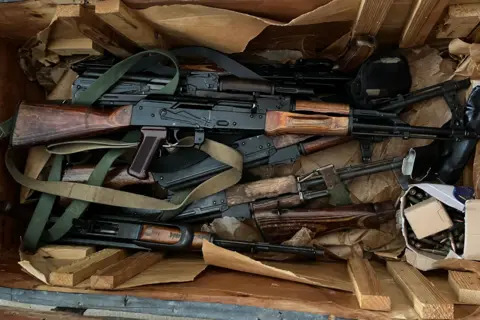 Aamir Peerzada/BBC
Aamir Peerzada/BBCWaleed Abdrabuh, a member of the group taking care of the reconciliation centres in Damascus, mentioned: “The aim is to have the weapons issued by the previous regime to be returned to the state. And for the members of the forces to get a civilian ID in order that they are often re-integrated into society.”
Underneath Assad, conscription into the military was obligatory for grownup males. Conscripts needed to hand of their civilian IDs and got army IDs as a substitute.
With out a civilian ID it will be laborious to get a job or transfer round freely within the nation, which partly explains why tens of hundreds have confirmed up at centres in numerous cities.
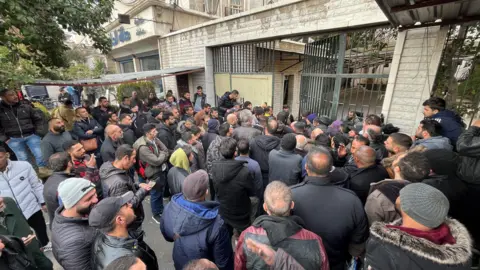 Aamir Peerzada/BBC
Aamir Peerzada/BBCOn the centre in Damascus, previously an workplace of Assad’s Baath Social gathering, lots of of males had been thronging to the gate, hankering to be let in.
Lots of them had been eager to distance themselves from the crimes of the regime.
“I did not take part in any of their unhealthy deeds. I think about them despicable acts. I did every thing to keep away from being part of massacres and crimes towards Syrians,” Mohammed al-Nadaf mentioned.
“I even tried to depart the army twice as a result of I knew I used to be on the incorrect aspect. Nevertheless it was not attainable to flee. The army had all my civilian paperwork.”
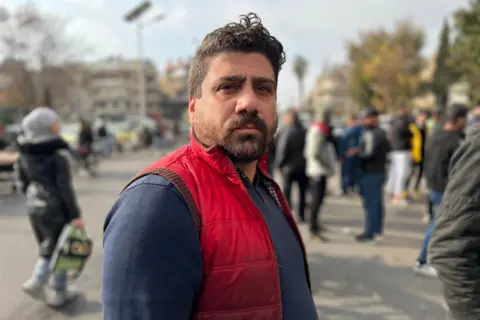 Aamir Peerzada/BBC
Aamir Peerzada/BBCSomar al-Hamwi, who served within the army for twenty-four years, mentioned: “Most individuals do not know something, OK? For me, I do not know what occurred in Saydnaya or any of the prisons.”
The BBC can not independently confirm their claims.
Anger on the regime and Assad’s determination to flee to Russia on 7 December because the rebels approached Damascus was additionally palpable.
“He [Bashar al-Assad] took some huge cash and ran away. He left all these folks, all of us army to our personal future,” mentioned Somar.
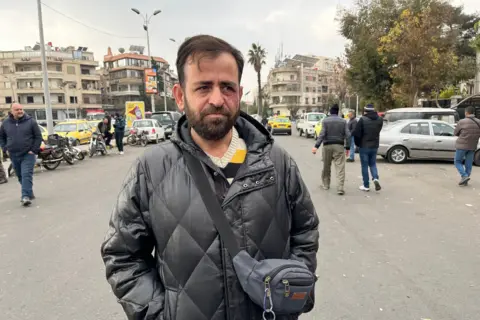 Aamir Peerzada/BBC
Aamir Peerzada/BBCThere have been many apprehensive faces among the many crowds on the reconciliation centre, however the atmosphere appeared comparatively amicable regardless of the 13-year civil warfare that left greater than half 1,000,000 folks lifeless.
“Everybody informed me it’s secure, and to go and make a settlement on the centre. The protection assurance made by HTS has made a giant distinction,” mentioned Mohammed al-Nadaf.
However from totally different components of Syria, stories of suspected revenge assaults involving killing, kidnapping and arson are more and more coming in. There are not any dependable statistics confirming what number of assaults have taken place however dozens have been reported on social media.
Previously week, three judges who arbitrated property-related issues within the beforehand regime-controlled city of Masyaf in north-western Syria – Mounzer Hassan, Mohammed Mahmoud and Youssef Ghanoum – had been killed. Sources from the hospital the place their our bodies had been examined have informed the BBC they had been struck within the head by a pointy object.
We went to Alamerea village to go to the house of Mounzer Hassan. It was naked, chilly, and seemed prefer it wanted repairs.
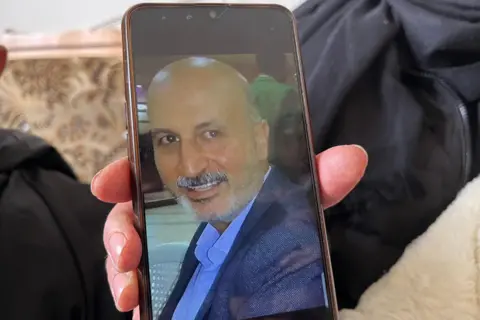 Aamir Peerzada/BBC
Aamir Peerzada/BBCMounzer’s spouse, Nadine Abdullah, informed us she believed her husband was focused as a result of he was an Alawite – the minority sect from which the Assad household originates, and to which most of the former regime’s political and army elite belonged.
“Since they had been civil, not legal court docket judges, I feel they had been killed just because they had been Alawites. All Alawites didn’t profit from Bashar al-Assad. Those that labored for the regime had been pressured to comply with orders, in any other case brutal measures can be imposed on them,” Nadine mentioned.
Mounzer’s brother Nazir mentioned: “It is a crime towards an harmless individual. It is unacceptable. These being killed had no connection to the politics of the regime. They had been simply working to assist their poor households.”
Mounzer was the daddy of 4 younger kids, and was the one wage earner in his household, additionally taking care of his ailing father and brother.
His household mentioned they had been talking out as a result of they need such deaths prevented in future.
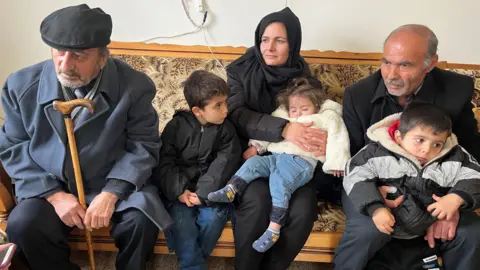 Aamir Peerzada/BBC
Aamir Peerzada/BBC“Everybody says HTS didn’t commit the crime. However because the governing authority now, they need to discover out who did it. They’ve to make sure safety for all of us,” Nadine mentioned.
HTS’s interim authorities has condemned the killing of the judges and mentioned it’ll discover the perpetrators. It has additionally denied being concerned in any reprisal killings.
Protests had been held in Masyaf following the killing of the judges, and lots of Alawites have informed the BBC they’re now apprehensive for his or her security.
Whereas HTS has introduced an amnesty for Assad’s forces, they’ve additionally mentioned these concerned in torture and killing might be held to account. That might be a tough steadiness to strike.
A couple of weeks because the fall of the regime, it’s a delicate second for Syria.
Extra reporting by Aamir Peerzada and Sanjay Ganguly.

